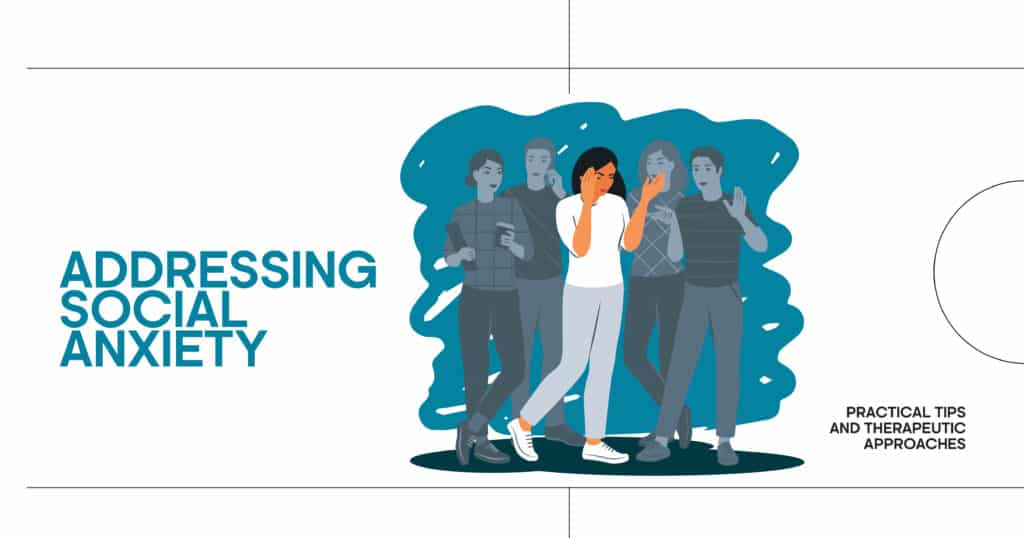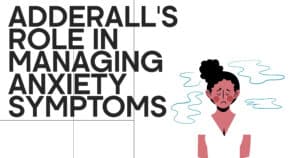Ever found yourself feeling your heart race, palms sweat, or throat go dry just thinking about an upcoming social event? You’re not alone. Social anxiety is a common experience that affects many people, often making even simple social interactions feel overwhelming.
Essential Takeaways
- Social Anxiety is Manageable: With the right strategies, such as gradual exposure, social skills training, and therapeutic approaches, social anxiety can be managed effectively.
- Therapy and Medication: Cognitive Behavioral Therapy (CBT), Acceptance and Commitment Therapy (ACT), and medication are valuable tools for treating social anxiety. Consult with a healthcare provider to determine the best approach for you.
- Support Systems Matter: Building a strong support system, including friends, family, and support groups, can provide the encouragement and assistance needed to overcome social anxiety.
But don’t worry—this post is here to help. We’ll explore social anxiety, why it happens, and how you can tackle it with practical tips and therapeutic approaches. So, grab a comfy seat, and let’s dive in!
What is Social Anxiety?
Social anxiety, or social phobia, is more than just feeling shy or nervous in social situations. It’s an intense fear of being judged, embarrassed, or humiliated in social settings.
This fear can be so intense that it interferes with daily activities, making engaging in social or work-related situations hard. You might worry excessively about meeting new people, speaking in public, or even making small talk with friends.
Symptoms of social anxiety can vary, but they often include:
- Physical Symptoms: Sweating, trembling, rapid heartbeat, dizziness, and nausea.
- Emotional Symptoms: Overwhelming fear of being judged, a sense of dread before social events, and feelings of inadequacy.
- Behavioral Symptoms: Avoiding social situations, excessive reliance on alcohol or other substances to cope, or experiencing significant distress when faced with social interactions.
Understanding that social anxiety isn’t just about being shy is essential. It’s a persistent and often debilitating condition that affects how you feel and behave in social situations.
Causes and Contributing Factors
Understanding the roots of social anxiety can help in managing it effectively. While the exact cause of social anxiety isn’t known, several factors may contribute:
- Genetic Factors: If you have a family history of anxiety disorders, you may be more prone to social anxiety.
- Environmental Factors: Traumatic social experiences, such as bullying or rejection, can trigger social anxiety.
- Psychological Factors: Low self-esteem and a tendency to overthink or catastrophize social situations can contribute to social anxiety.
Social anxiety is a complex interplay of genetic, environmental, and psychological factors, but understanding these can help you approach it with a clearer perspective.
Practical Tips for Managing Social Anxiety
Building Confidence through Exposure
One of the most effective ways to manage social anxiety is through gradual exposure. This technique involves facing your fears in small, manageable steps. Start with less intimidating situations and gradually move up to more challenging scenarios.
Here’s how to get started:
- Identify Your Triggers: List the social situations that cause you the most anxiety.
- Create a Hierarchy: Rank these situations from least to most anxiety-provoking.
- Start Small: Begin with the least intimidating situation on your list. For example, start by making small talk with a cashier.
- Gradually Increase Exposure: As you become more comfortable, tackle more challenging situations, like attending a small social gathering.
Example: If public speaking is a significant source of anxiety, start by speaking in front of a mirror, then progress to presenting to a friend, and eventually to a small group. Celebrate each success along the way to build confidence.
Developing Social Skills

Improving social skills can also help manage social anxiety. Feeling more competent in social interactions can reduce anxiety and boost confidence.
Here are some tips:
- Practice Conversation Starters: Prepare a few go-to questions or topics to discuss in social situations. For example, ask about someone’s interests or recent experiences.
- Work on Body Language: Positive body language, such as maintaining eye contact and smiling, can make you appear more approachable and confident.
- Role-Play: Practice social scenarios with a trusted friend or family member to build confidence and improve your responses.
Remember, social skills improve with practice. Don’t be discouraged if it feels awkward initially—keep practicing, and it will get easier over time.
Mindfulness and Relaxation Techniques
Mindfulness and relaxation techniques can help manage the physical and emotional symptoms of social anxiety. These practices can help you stay calm and centered during social interactions.
Try these techniques:
- Deep Breathing: Practice deep breathing exercises to calm your nervous system. Inhale deeply through your nose for a count of four, hold for a count of four, and exhale slowly through your mouth for a count of four.
- Progressive Muscle Relaxation: Tense and then relax different muscle groups in your body to release physical tension. Start with your toes and work your way up to your head.
- Mindfulness Meditation: Focus on the present moment without judgment. Try guided meditations or mindfulness apps to help you stay grounded and reduce anxiety.
Incorporating these techniques into your daily routine can help you manage anxiety more effectively and maintain a sense of calm during social situations.
Therapeutic Approaches for Social Anxiety
Cognitive Behavioral Therapy (CBT)
Cognitive Behavioral Therapy (CBT) is a widely used and effective treatment for social anxiety. CBT focuses on identifying and changing negative thought patterns and behaviors that contribute to anxiety.
Key CBT Techniques:
- Cognitive Restructuring: Challenge and reframe negative thoughts about social situations. For example, if you think, “I’ll embarrass myself,” challenge this thought with evidence of past successes.
- Behavioral Experiments: Test the accuracy of your negative beliefs by conducting small experiments. For example, if you fear that people will judge you negatively, try initiating a conversation and observe the outcome.
- Exposure Therapy: Gradual exposure to feared social situations, as mentioned earlier, is a core component of CBT. This helps desensitize you to anxiety-provoking scenarios.

Working with a trained CBT therapist can help you develop personalized strategies and effectively address your social anxiety.
Acceptance and Commitment Therapy (ACT)
Acceptance and Commitment Therapy (ACT) is another therapeutic approach that can be beneficial for social anxiety. ACT emphasizes accepting your thoughts and feelings rather than fighting them and committing to actions aligned with your values.
Key ACT Techniques:
- Mindfulness: Focus on the present moment and accept your thoughts and feelings without judgment. This helps reduce the impact of anxiety on your behavior.
- Values Clarification: Identify your core values and use them as motivation to engage in social situations despite your anxiety.
- Commitment to Action: Take action based on your values, even when anxiety is present. For example, if building relationships is a core value, commit to attending social events despite feeling anxious.
ACT can help you develop a more flexible and compassionate approach to managing social anxiety, allowing you to live a more fulfilling life.
Medication Options
In some cases, medication may be prescribed to help manage social anxiety, especially when other treatments alone are not sufficient. It’s important to consult with a healthcare professional to discuss the benefits and risks of medication.
Common Medications:
- Selective Serotonin Reuptake Inhibitors (SSRIs): These are often used to treat social anxiety and can help improve mood and reduce anxiety symptoms.
- Serotonin-Norepinephrine Reuptake Inhibitors (SNRIs): Similar to SSRIs, SNRIs can help alleviate anxiety symptoms.
- Beta-Blockers: These may be prescribed to manage physical symptoms of anxiety, such as rapid heartbeat and trembling, particularly in performance situations.
Medication should always be used in conjunction with other therapeutic approaches and under the guidance of a healthcare professional.
Creating a Support System
Seeking Support from Friends and Family
Having a supportive network can significantly improve one’s management of social anxiety. Friends and family can offer encouragement, understanding, and practical support.
Here’s how to seek support:
- Open Communication: Talk to your loved ones about your social anxiety. Let them know how they can help and what you’re going through.
- Involve Them in Your Progress: Share your goals and progress with them. They can offer encouragement and celebrate your successes with you.
- Ask for Specific Support: Let them know if you need help with certain situations, such as attending a social event. They can accompany you or offer reassurance.

Support from loved ones can provide comfort and reduce the sense of isolation that often accompanies social anxiety.
Joining Support Groups
Support groups can be a valuable resource for individuals with social anxiety. They provide a safe space to share experiences, learn from others, and receive support.
Finding Support Groups:
- Local Groups: Look for local support groups for social anxiety through mental health organizations, community centers, or healthcare providers.
- Online Groups: There are many online support groups and forums where you can connect with others who understand what you’re going through.
Participating in support groups can help you feel less alone and provide practical tips and encouragement from others who have faced similar challenges.
Maintaining Progress and Staying Motivated
Setting Realistic Goals
Setting realistic and achievable goals is crucial for maintaining progress and staying motivated in managing social anxiety.
Here’s how to set practical goals:
- Be Specific: Define clear and specific goals, such as “I will attend a small social gathering this month.”
- Break Goals Down: Break larger goals into smaller, manageable steps. For example, start by attending a more minor event before progressing to larger ones.
- Track Progress: Keep a journal or use an app to track your progress and celebrate small victories.
Setting and achieving small goals can help build confidence and provide a sense of accomplishment.
Continuing Therapy and Self-Care
Ongoing therapy and self-care are essential for maintaining progress and managing social anxiety effectively.
Tips for Continuing Therapy and Self-Care:
- Regular Therapy Sessions: Continue attending therapy sessions to address ongoing issues and refine your strategies.
- Practice Self-Care: Engage in activities that promote well-being and reduce stress, such as exercise, hobbies, and relaxation techniques.
- Stay Connected: Connect with supportive friends, family, or support groups.
Self-care and continued therapy can help you manage social anxiety and maintain a positive outlook on your progress.
Conclusion
Addressing social anxiety is a journey, but with the right strategies and support, it’s a journey you don’t have to face alone. From understanding the roots of social anxiety to implementing practical tips and therapeutic approaches, there are many ways to manage and overcome it. Remember, progress takes time and each small step counts.
If you or someone you know is struggling with social anxiety, don’t hesitate to seek professional help. Our team of experts is here to provide support and personalized treatment plans to help you overcome social anxiety and lead a more fulfilling life. Contact us today to schedule a consultation and start your journey towards a more confident and socially comfortable you.
Call to Action: Ready to take the next step towards managing your social anxiety? Contact our team today to explore personalized treatment options and get your needed support. Don’t let social anxiety hold you back—contact us now and start your journey to a more confident you!
FAQs
1. What are the common signs of social anxiety?
Common signs of social anxiety include intense fear of social situations, physical symptoms like sweating and trembling, excessive worry about being judged or embarrassed, and avoidance of social interactions.
2. Can social anxiety be treated without therapy?
While therapy is a highly effective treatment, social anxiety can also be managed with self-help strategies, such as gradual exposure, mindfulness, and social skills training. However, professional guidance can provide more tailored support.
3. How long does it take to overcome social anxiety?
The timeline for overcoming social anxiety varies for each individual. Some people may notice improvements within a few weeks, while others may take several months or longer. Consistency and patience are key to making progress.
4. Are there any medications for social anxiety?
Yes, medications such as selective serotonin reuptake inhibitors (SSRIs) and serotonin-norepinephrine reuptake inhibitors (SNRIs) are commonly prescribed for social anxiety. It’s important to discuss medication options with a healthcare provider.
5. How can I support a loved one with social anxiety?
Offer understanding, encouragement, and patience. Listen to their concerns, provide reassurance, and help them find professional support. Joining them in social activities can also be helpful.







